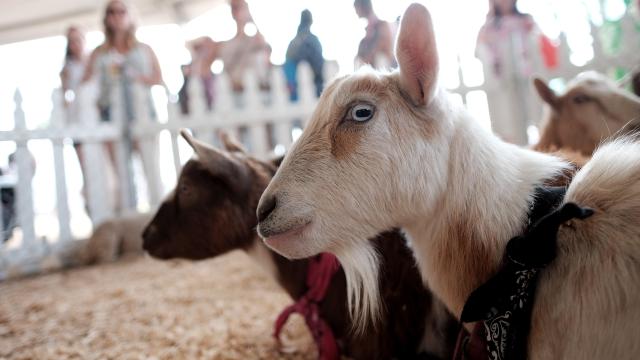Those adorably tame goats and other animals you love to touch at your local petting zoo might not be so harmless after all, according to some early research out this weekend. It suggests that many petting zoo animals could harbour and potentially spread dangerous antibiotic-resistant bacteria, including two strains of Escherichia coli that cause foodborne illness and urinary tract infections, respectively.
Researchers in Israel, including veterinarians, collected samples of poop, skin, fur, and feathers from over 200 animals across 42 species who lived in one of eight petting zoos in the country. They then tested the samples for bacteria resistant to more than one class of antibiotics.
The team was interested in spotting two groups of highly multidrug-resistant bacteria known as extended spectrum beta-lactamase (ESBL) Enterobacteriaceae and AmpC-producing Enterobacteriaceae (AmpC-E). These bacteria are some of the most feared superbugs around, largely because they carry mutations that make them resistant to a wide variety of antibiotics. Some of these mutations can also easily be passed to other species of bacteria, through mobile bits of DNA called plasmids.
Even scarier is that many resistant bacteria first evolve in animals and then go on to infect people. These sorts of outbreaks typically originate in livestock, but they’re occasionally caused by cuddlier animals, too. And it’s the infection risk posed by these animals that the researchers, led by Shiri Navon-Venezia, a microbiologist at Ariel University, were hoping to get a grasp on.
“We are interested in antibiotic resistance in companion animals (not farm animals) and understanding the spread and transmission of multidrug-resistant pathogens in a one-health perspective,” Navon-Venezia told Gizmodo via email. Petting zoos in particular, she added, provide plenty of opportunities for visitors to come into direct and indirect contact with these germs. This could involve being licked by an animal or breathing in poop particles suspended in air.
In total, they found that about 12 per cent of the animals sampled had at least one strain of an ESBL or AmpC-E bacteria living on them, while a quarter of these animals (3 per cent) had several multidrug-resistant strains. Some of the bacteria found were relatively harmless, meaning they rarely cause illness in humans. But strains of resistant E. coli ST656 and ST127 were much more concerning. ST656 is a toxin-spewing strain that can cause severe, even fatal diarrhoea, while ST127 is one of many strains that cause urinary tract infections—both are highly virulent.
Right now, neither strain seems to be causing huge outbreaks with any regularity. And the team’s results, based entirely in Israel, might not entirely translate to other countries. But Navon-Venezia said the chances of these and other ESBL or AmpC-E bacteria being found in petting zoos are likely to be similar in any country where they’re already detected in high levels, which include those in Southern, Eastern, and Western Europe.
In the U.S., more than 100 outbreaks between 2010 to 2015 began at petting zoos and animal fairs, according to the Centres of Disease Control and Prevention. The vast majority of these U.S. outbreaks likely involved bacteria still susceptible to antibiotics, but it’s only a matter of time (if it hasn’t happened already) before pets and other companion animals start becoming a common conduit for these infections here too.
Just last year, an outbreak of highly resistant Campylobacter jejuni, a stomach bug, was ultimately traced to pet store puppies; it sickened more than 100 people across 18 states and hospitalized more than two dozen.
The team’s findings were presented this weekend at the European Congress of Clinical Microbiology & Infectious Diseases in Amdastam, meaning they’re preliminary. But Navon-Venezia does plan to submit them for publication in a peer-reviewed journal. In the meantime, she says her research should serve as an early warning for petting zoos to stay proactive in preventing outbreaks.
She suggests zoos could take precautions like keeping eating and drinking areas away from the animals, as well as reinforcing the importance of washing your hands after interacting with them. More diligent steps would include actively monitoring animals for resistant bacteria, as well as isolating animals on antibiotics away from the rest of the population, since they’re more likely to develop and carry resistant bacteria.
